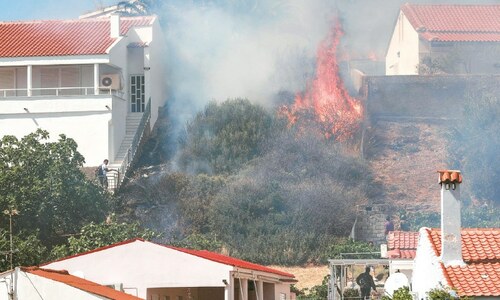CHICAGO: Top US cattle feeding companies sent 1,000-pound carcasses to a Kansas landfill, where they were flattened by loader machines and mixed with trash, after a June heatwave killed thousands of cows, documents show. Other cattle were buried in unlined graves, a feeding company said.
Neither is a typical method for disposing of bodies. But so many cows died in the unusual heat and humidity that facilities that normally convert carcasses into pet food and fertilizer products were overwhelmed, prompting the state government and cattle feeders to take emergency measures.
The mass deaths and subsequent scramble to deal with decaying bodies sparked a push for changes in the meat industry in Kansas, the third-largest US cattle state.
Kansas is forecast to see more high temperatures that can stress and potentially kill cattle this summer, adding to the myriad problems caused by increasingly extreme weather linked to climate change.
Although state officials authorised companies to dispose of carcasses at the Seward County Landfill in Liberal, Kansas, they are now considering alternatives to decrease the risks for foul smells and other problems if more deaths occur, the landfill’s director said.
The disposal methods and identities of companies that lost cattle have not previously been reported. They were contained in documents obtained from the Kansas Department of Health and Environment and confirmed by some companies involved.
At least 2,117 cattle died after humidity levels spiked, winds disappeared and temperatures topped 100 degrees Fahrenheit (38C) in southwestern Kansas during the weekend of June 11, state records show. It was early in the year for such heat and before some cattle had fully shed their winter coats. Seward County Landfill Director Brock Theiner estimated the dump alone took in roughly 1,850 to 2,000 dead cattle.
Landfill workers used loading equipment with steel wheels to flatten the cattle to about eight inches and mixed the bodies with garbage, a process that took nearly three weeks, Theiner said.
“After you run them over they’ll go flat, but they’re gonna sponge back up,” Theiner said. “You get a mass of ‘em and you get on it, and it’s like running a piece of equipment on top of a water bed. It moves.” Kansas temporarily suspended requirements that carcasses be covered by at least six inches (15.24 cm) of dirt or trash each day due to the unexpected deaths, Theiner said. The carcasses had a putrid smell up close, he added.
“Once you got in it, whew!” he said. “I have a couple operators that have iron guts.” Landfills are the last resort for carcasses because of complications with smells, animals digging in trash, and difficulties covering the bodies immediately, Theiner said. Kansas officials are exploring whether more cattle could be composted at feedlots instead, he said. The Kansas Department of Health and Environment did not respond to questions.
Published in Dawn, July 27th, 2022













































